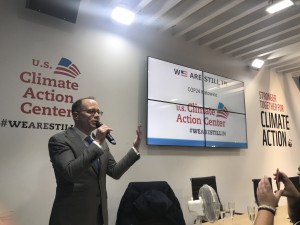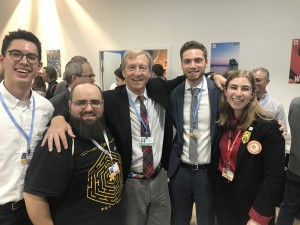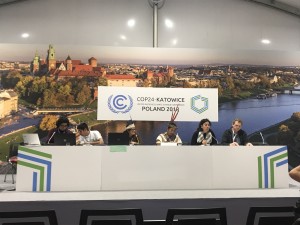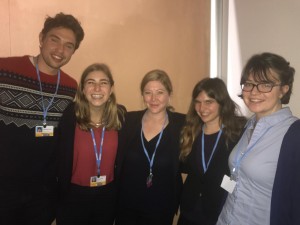Friday marked my last day at the COP, and I am officially home! In addition to attending some final negotiations and side events that interested me, I spent a good deal of Friday thinking about how to bring my experience at the COP back to the States with me upon leaving Poland. I therefore attended a couple of wonderful interactive events hosted by We Are Still In (an organization of substate and nonstate actors in the U.S. who are committed to upholding the Paris Agreement on a subnational level, despite Trump’s decision to withdraw nationally) at the U.S. Climate Action Center in the Country Pavilion section of the conference center.
I attended a U.S. Climate Café, which was essentially a facilitated dialogue between students from various universities across the country and other local- and state-level actors. The dialogue focused on what we are bringing to the COP (based on our personal backgrounds, skills, experiences, and the organizations that we are involved with), as well as what we are planning to take back with us. The organizers of this event emphasized how its goal was to provide us with a space to actually interact with each other, since most other COP events (i.e., negotiations and panels) involve sitting, listening, and absorbing without being able to meaningfully engage with the other people who are here and without thinking about how to translate this knowledge into action upon returning home. This event also encouraged us to think about what we are bringing to this conference and the importance and influence of our role in being here, rather than just what we can take away from it.
I really enjoyed this event because of these goals. It was really wonderful to have the opportunity to actually engage with others, rather than to simply listen and absorb. Being pushed to think tangibly about what I am bringing into and taking away from this conference also helped me to better understand my role and purpose in being at the COP, which I found very beneficial. For example, I thought about how I can use these negotiations and international climate action as a pressure point in my national climate organizing with Sunrise Movement upon returning to the states (which I did yesterday at a huge action in Washington, D.C.). I also thought about how the side events that I attended regarding indigenous rights and climate litigation can inform the law and policy work that I plan to pursue after graduating this spring.
I also really enjoyed and appreciated being in a U.S.-centric space for the first time at the COP. It felt very empowering to be in a collaborative space with so many other incredible people who are working to effect meaningful change in the U.S., especially given Trump’s decision to withdraw the U.S. from the Paris Agreement and how that decision has shaped both the international community’s perception of the U.S. and our presence on the international stage. I felt reaffirmed and supported in the work that I do, and felt that I was not alone in my commitment to effecting climate action in the U.S.
Below is a picture of me with some students who I met from other universities in the States and Tom Steyer, the CEO of NextGen America — an environmental advocacy nonprofit and political action committee that supports candidates and policies that take action against climate change.
I am so incredibly grateful to have had the opportunity to attend the COP, and am looking forward to following the posts of our group that is there this week! Thanks for keeping up with me last week — ta ta for now!
— Shana



